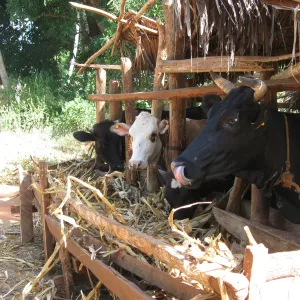Using gendered assessment to promote sustainable livestock feed management in Dodoma, Tanzania
Feed resource availability, quality, accessibility and seasonal variations significantly affect food and nutritional security in Tanzania. Alongside climate variability, these factors are major determinants of animal health and productivity, and thus the incomes of farmers. As part of measures to optimize feed use and animal productivity to improve farm yields and revenues, the International Livestock Research Institute (ILRI) has started

Using gendered assessment to promote sustainable livestock feed management in Dodoma, Tanzania
Feed resource availability, quality, accessibility and seasonal variations significantly affect food and nutritional security in Tanzania.
Alongside climate variability, these factors are major determinants of animal health and productivity, and thus the incomes of farmers.
As part of measures to optimize feed use and animal productivity to improve farm yields and revenues, the International Livestock Research Institute (ILRI) has started a comprehensive animal feed assessment and inventory training program for smallholder livestock keepers Tanzania.
This program is targeting academic institutions, government agencies and research centres to strengthen the national agricultural research system’s capacity to effectively address feed resource challenges and improve food and nutritional security.
The work focuses on identifying ways of tackling feed-related issues at community and national levels, and assessing national capacity to examine feed-related challenges and design appropriate interventions.
On 6–10 May 2024, 12 trainees attended the Gendered Feed Assessment Tool (G-FEAST) training conducted in Dodoma.
G-FEAST is the gendered version of the Feed Assessment Tool (FEAST), which was developed by ILRI in 2009.
Using farmer-centred research tools such as focus group discussions and one-on-one interviews, the tool identifies gender relations that affect animal feeding practices, the uptake of feeding interventions, and differences in opportunities and constraints in animal feeding between different household types.
The training focused on agropastoral communities, with the primary purpose of building the capacity of G-FEAST enumerators and facilitators in Tanzania.
They will then use their knowledge and skills to conduct comprehensive feed assessments in various locations in Tanzania.

